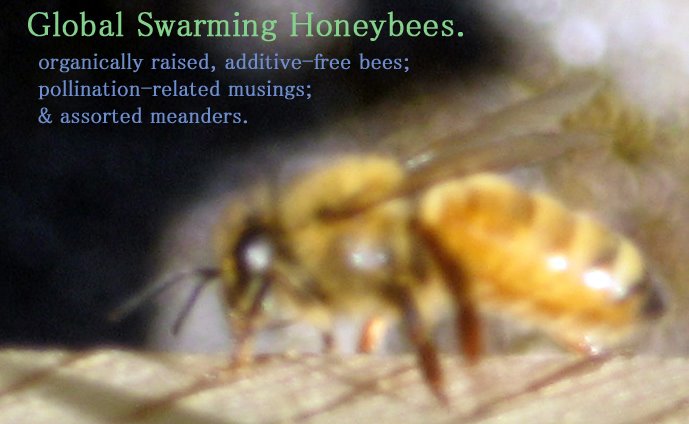The oregano grows in a small raised herb bed. It all looked very neat and prim a few short weeks ago, but at this point in the summer, the bed's nearly overrun with borage and dill that self-seeded in past years.
The bees don't bother much with the dill blossoms—that's wasp terrain, too light and feathery to for the "heavy-weight" pollinators. But honeybees and bumblebees adore the borage flowers, tumbling by the score into what's now a wild thicket of prickly leaves and blue star-shaped flowers, cheerful as those a child might draw. I grow borage exclusively for the good mood it puts both me and the bees in—and for its long blooming period, which keeps the bees busy even as the last of the goldenrod jumps ship.
Reaching with care into the chaos of dill umbrals, falling stars and intensely buzzing bees, I carefully cut a couple of dozen long springs of oregano to bind with twine and hang in the dry, warm attic until the leaves are dessicated enough to crumble into jars. It's one of the most pleasant late-summer garden tasks I know—the scent of oregano on my paws, the bee-loud soundtrack, and lustful thoughts of the well-spiced tomato sauces to come.
I lay the sprigs on a white tea towel and inspect them closely to get them as clean as possible. Of course, I find a biologically rich world embedded in those leaves and branches—a world of tiny snails and spiders, remnants of cocoon, miniscule black eggs shiny as caviar, leaves that have mysteriously wilted, leaves that have been not-so-mysteriously gnawed upon, and a myriad of other "imperfections" that tell one hell of a tale—the Lively Garden, a Place of Action.
As best I can, I shake off the major league bugs, then gently brush away the minor league critters. Next, I pluck as many of the blackened leaves as my attention span will allow, till mostly clean, green leaves remain. Even so, I'm left with a smattering of unfashionably discolored leaves and a few ethereal vestiges of insect travel and leisure.
In other words, though the drying process will hide some of the oregano's blemishes and the cooking process erase any conceivable risk that might be had in ingesting a trace of vintage spiderweb, my dried oregano won't be purged of the place from whence it came, like the mass-produced "food products" that get power-washed, anti-bioticized, and irradiated into oblivion before being marketed to our tables.
To me, these earthly, flawed sprigs of herbaceous delight are clean in the fullest, most vibrant sense, reflecting the multifaceted meanings you'll find when you look up "clean" in the dictionary—free from violations, spiritually or ceremonially pure, unencumbered, unadulterated.
I'll take all that over anticeptic any day of the week. And so will my bees.


That reminds me: I have to gather my herbs to dry as well. Thanks!
ReplyDeleteMy Dad's planted borage in and around his garden for 30 years or more to attract the bees and swears by it.
Hi Gord,
ReplyDeleteI think borage is one of the more underrated bee plants out there, and glad to know your dad's experience supports that notion. Good luck with your herb-drying exploits!
Lovely! Thank you!
ReplyDeleteWonderful blog, wonderful writer, wonderful farmer. Thank you.
ReplyDeleteThank you, Leila. I'm so glad you enjoy the blog. These are nice words to start off a Monday with!
ReplyDelete